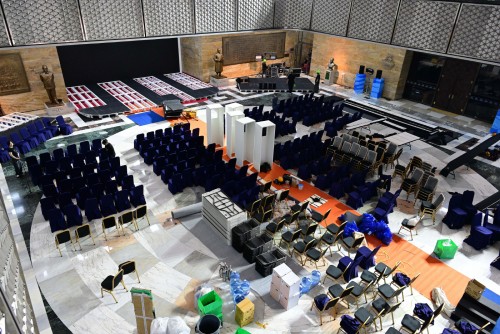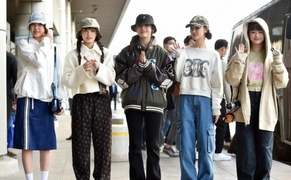 |
| On June 3, the day of the 21st presidential election, staff members busily prepare for the upcoming presidential inauguration ceremony at the rotunda hall of the National Assembly. / Source: Lee Byung-hwa, photolbh@ |
Lee Jae-myung of the Democratic Party was officially declared the 21st president of South Korea on June 4, following his victory in the June 3 presidential by-election, where exit polls projected him to win with 51.6 percent of the vote. With the National Election Commission (NEC) formally confirming his election at its plenary session on the morning of June 4, President Lee has now begun his term.
This election, held as a by-election following the impeachment of former President Yoon Suk Yeol, differs from regular presidential races. Without a transition period, President Lee assumes office immediately upon confirmation. The NEC, led by Chairman Noh Tae-ak, convened between 7 and 9 a.m. on June 4 to officially declare Lee's presidency.
In the 2017 by-election following the impeachment of former President Park Geun-hye, the NEC similarly confirmed then-President Moon Jae-in’s election the morning after the vote. President Lee is scheduled to hold a modest inauguration ceremony at the National Assembly later today. While presidential inaugurations have traditionally been held in front of the National Assembly since South Korea adopted direct presidential elections in 1987, today’s ceremony is expected to be simplified, with traditional events such as the Bosingak bell-ringing and military performances likely to be omitted due to the immediate start of the new term.
President Lee’s first official act will be a visit to Seoul National Cemetery, continuing a tradition followed by all presidents from Roh Moo-hyun to Yoon Suk Yeol on their inauguration day.
Following this, the president is expected to move quickly to appoint key officials, including the prime minister, presidential chiefs of staff, and ministers. In 2017, Moon Jae-in announced appointments for the prime minister and National Intelligence Service director on his first day. Given the absence of a transition committee, President Lee will temporarily work alongside ministers from the previous administration. Deputy Prime Minister and Education Minister Lee Ju-ho will serve as acting prime minister until a new appointment is made.
It previously took Moon 195 days to complete his initial cabinet appointments, and political observers suggest that forming the new administration may similarly take time.
In the afternoon, President Lee is expected to begin diplomatic engagements, meeting with foreign dignitaries and delegations at the presidential office.
The Yongsan presidential office will serve as President Lee’s official workplace. He had announced on May 30 that he would use the Yongsan office if elected. After commencing his term there, he plans to move to a newly restored office following renovations at the former Blue House complex.
Most Read
-
1
-
2
-
3
-
4
-
5
-
6
-
7





















